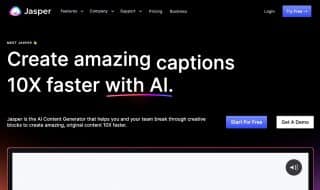What is a One-Click AI Writer? 7 Tool Options to Try

AI has been all the rage, for good and ill, for a few years now. It has undeniably changed the way marketing is done, from the spammiest trash-tier garbage to high-end marketing with AI-driven insights and SEO tools.
One thing I've been seeing increasingly is mention of the concept of a "one-click AI writer".
The promise is intriguing. If you could fill in some boxes, write a pitch, or set up some keyword and style information, click one button, and have a publish-ready article in your hands in minutes, would you do it?
It's a tricky proposition. As of yet, none of the LLMs have proven to be that good, at least as far as I'm concerned. They can certainly generate a blog post, but that blog post is unlikely to be professional-quality when you look past the surface.
In my experience, it takes a lot of hand-holding, iteration, and a very complex prompt to get an LLM to output a professional-quality blog post. But then, as the owner of a content marketing agency for over a decade, I have pretty high standards.
Still, I wanted to talk about this because I find the discourse around AI to be pretty exhausting, and there's a ton of misinformation, outright lies, and unrealistic marketing floating around.
What is a One-Click AI Writer?
To start, let's talk about what a one-click AI writer is.
First, the concept: a one-click AI writer is a tool based on an LLM or a combination of LLMs, which is capable of generating a full blog post in a single click. This may or may not involve a bunch of setup, such as specifying target keywords and topics, choosing tone and style, and other attributes of the finished content.
Now, the reality: a one-click AI article writer is a fiction.
Let me give you an example. One of the top-ranked blog posts out there for one-click AI writers lists Jasper as one of them.

But I've tried Jasper. And unless they changed things a whole lot since I reviewed it, it's very much not one click. You have to specify a template, specify keywords, go through a whole process refining a brand style and adding a brand voice library.
I guess technically you could navigate this all with your keyboard until it comes time to click the final Generate button, and then click once to generate content, but that's kind of disingenuous, don't you think?
Technically speaking, ChatGPT is a lot more like a one-click AI writer in the sense that you type in a prompt and click submit once, but there's a pretty good chance you're going to do several rounds of iteration to get the results you want, especially with the newer models.
There's one big caveat to all of the above, though.
Specifically, many of these AI writers can generate certain types of content with one click, in a way that isn't going to require extensive fact-checking or review.
The trick is the type of content.
- There are tools you can upload an image to and have it generate alt text for that image.
- There are tools with social media post templates embedded in them that can generate a Facebook or Twitter post with one click.
- There are tools that can generate metadata for a blog post, like a meta description summary, in one click.
These are all technically forms of AI writing, and all technically can generate a functional, unique, and useful output in a single click.
You aren't going to go from a keyword and topic idea to a fully-fleshed-out blog post with a single click. But you can use one-click tools to help you accomplish narrower, shorter tasks using AI.
Arguably, this is the best use case for AI. I know a lot of people are very excited to never have to write again and let an LLM do all the work for them, but I still think we're far enough away from a reliable, trustworthy LLM for long-form content that it's still a fiction. But, for speeding up the more tedious manual tasks? That's the best case for automation.
So, with all of that in mind, here are some one-click AI writing tools you might consider trying out.
#1: Tailwind's Alt Text Generator
Alt text is one of those critical but tedious tasks that has to be handled for marketing. The presence of alt text is a ranking factor, albeit a minor one, and it's an important accessibility factor as well.
Tailwind's image alt text generator is part of their set of free social media tools, and you can find it here. All you need to do is upload an image, and their AI will analyze it and write a description for it.

In my testing, it's pretty solid for what it does, but there are some important limitations.
For example, I tested it on a screenshot of a portion of an app I was writing about. It correctly identifies the shape and color of the box, the text in the box, and the important elements of the box. But what it doesn't do is know what the box is or what purpose it serves.
Another test was on a photo of a bowl of candies, like what you might find on a recipe blog. It correctly identifies the kind of bowl, the kind of food item as candies, and even the overall vibe of the image. What it can't do is identify what candies they are specifically.
That's the drawback: a lack of context. I can easily edit the right word or keywords into the alt text and have 95% of the work done for me by the tool, or I can use the generic description as-is. I personally prefer the editing method, since image alt text keywords are very useful for image search SEO, but if accessibility is your only concern, it's fine as-is.
The only other downside is that, since it's a web-based tool, you have to upload the image, let their AI scan it, and copy the alt text it generates. That's fine for one or two images, but if you wanted to go back and revamp the alt text across dozens of blog posts with half a dozen images each, it's going to be immensely tedious.
#2: Ahrefs' Product Description Generator
Product descriptions are another kind of tedious writing task that eats up a ton of time. Google's copied content and duplicate content filters mean you really need a unique product description to stand out, so you can't just copy the product description from the manufacturer or wholesaler of whatever product you're selling. But it's tedious to write unique descriptions yourself, and costly to hire a freelancer to write them for you.
The Ahrefs Product Description Generator works as an AI tool to help you out. You can upload a photo, paste in the key information (nutritional information, product specifications, size and color, or whatever else), and choose a few specifications like writing tone, number of paragraphs, and whether it's concise or detailed. Then click generate and wait for the output.

In my testing, this generator works best for shorter or more concise writing, unless you have a lot of details to pack in. It's a balance you need to strike. Trying to cram too many details in a short space leads to cramped writing, while trying to stretch too few over a larger space means the AI invents details that aren't really relevant.
Still, just like the alt text generator, this can save you the work and get you 95% of the way to a completed product description. It might need a little review, but it's way better than doing it on your own.
#3: Koala's Article Meta Description Generator
While we're on the topic of tedious tasks that need doing for marketing, but are often neglected because of the annoyance of doing them, we come to meta descriptions. Even though they might not seem necessary at all these days, I find it's still worth the effort to add them instead of relying on Google to make up their own for you.
This one was harder to find a tool for. The majority of meta description generators out there ask you to write a description or summary of your article for it to turn into a meta description. Okay, but if I'm going to write that, why don't I just write the description myself?
Conversely, you can use article summarizers, but summarizers generally produce more generic, non-optimized content, and it's longer and not formatted as a meta description. So, not useful, except maybe to feed into the meta generators.

Koala's meta description generator is the best one I found that lets you just upload a full article and generates a meta description for you based on it. It even gives you several options to choose from. Of course, it's pretty much just a shell for ChatGPT and Claude, so you could go to those yourself and write a generic prompt specifying what a meta description should look like, but you know. That's true of all of these tools.
You are also limited in how many times you can use this tool before they want you to pay for an account, unlike the others on the list so far. It's only $9 per month for their cheapest plan, and it's more than enough for as many meta descriptions as you'd want.
#4: Decopy's Article Summarizer
I mentioned summarizers briefly in the previous section, but I figured it could be a section of its own. An AI summarizer takes a long and complex piece of writing and generates a shorter and more digestible summary of the content for you.
I've seen people use these for a lot of different purposes, and I've seen them be a little inaccurate before, so consider this my disclaimer: review what they give you, and try to know enough about the subject to see if it passes the sniff test.
In this case, Decopy's summarizer is the best summarizer I've found. I tested it on a lengthy medical journal article (over 9,000 words), and it gave me a pretty reliable and accurate 900-word summary. It's enough to give you a pretty good idea of what a text says, so you can use that information to synthesize into something more robust for full article research.

Personally, I don't necessarily find these too useful, but that's largely because I have a decade of experience in fast-reading and skimming content to extract value and research from it. If I didn't have that experience, a tool to help might be a great thing to have on hand.
As for why I chose Decopy, nearly every other summarizer out there is actually all the same one whitelabeled, and they all have a 600-word cap on what they can summarize. Friends, I say this with all due respect, but by the time I've pasted 600 words into your AI and waited for it to generate a summary, I've already read the 600 words.
#5: Koala's Affiliate Content Generator
Affiliate marketing is perpetually the realm of "good enough" content. Since you're selling products you don't really have an investment in, you can pivot whenever new products come along. You're in a constant battle with changing SEO standards to be good enough without wasting too much time or effort; it's a realm where AI is ideal.
I already have Koala on this list for the meta description generator, but they get a full entry for their general KoalaWriter tool as well. It's not quite one click, of course. You have to fill out a lot of basic information, which is all fed into a template prompt in the background, which goes to your choice of Claude or a GPT model. But it's one of the better options for generating full-length content that works fine.

For example, if you want to write a post reviewing an Amazon product for the Amazon affiliate payout, you can use Koala and plug in the URL to get a real summary and sentiment from aggregate reviews of the product. You can even plug in your affiliate ID and have it inject your links directly, so you don't even need to do that part manually.
The only downside is the cost; as a paid tool, you're looking at a minimum of $50 per month for all of the advanced features to get the most out of the tool. You also probably aren't passing an AI detector, but in the realm of affiliate marketing, that's not as big a drawback as it can be elsewhere.
#6: Katteb's Source-Cited Content Generator
Katteb is, in my view, one of the currently best article creators out there. They acknowledge that AI has issues with hallucinations and accuracy, and much like how Google's AI overviews are citing sources they pull from, this one also cites everything they reference.

As a tool, it can produce a lot of content, with internal and external links, and has a fairly reliable accuracy rate. What it doesn't do is pass all of the AI checkers, but that's not really possible with a tool that can generate hundreds of posts in a few actions.
This is also possibly one of the riskiest tools on this list. Google's stance on AI generation is fairly clear right now: the line they don't want you to cross is full automation. Katteb (and Koala, and to an extent, the next entry on the list) are all pretty fully automated. Personally, I wouldn't risk it, but if you're spinning up a new site or you're not very invested in your current one, and if you can take a Google penalty in stride, maybe they'll work for you.
#7: Autoblogging's Full Everything AI
Last up is one I'm hesitant to even mention. Autoblogging.ai is basically a fully automated blog creation tool. It is, in a sense, everything people want out of AI for blogging. I think it's also somewhat revealing of the current limitations of AI, in that you can pay a relatively cheap fee for content, pay an additional flat rate for human review, or pay a very steep fee for pro-level, fully-managed blogging.

Sure, if you have $10,000 for a whole blog generated for you, with custom human editing and management, automated posting, and everything else, and you want the AI to do it, be my guest. Or you could pay for fully-human content creation and get something leagues better without jumping through AI hoops first, but that's your call.
I mostly wanted to add this one to show you that there are companies offering these kinds of one-click tools, but the truth behind them is that you're either getting bland, mediocre AI output, or you're adding on human review. It's not as one-click as they want you to think.










Comments